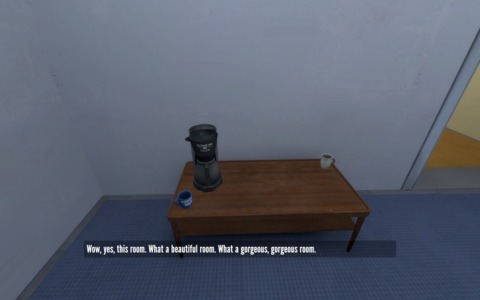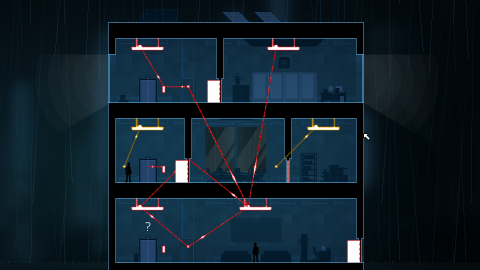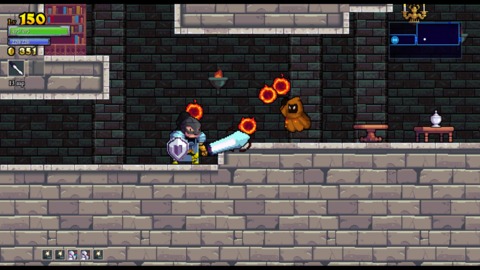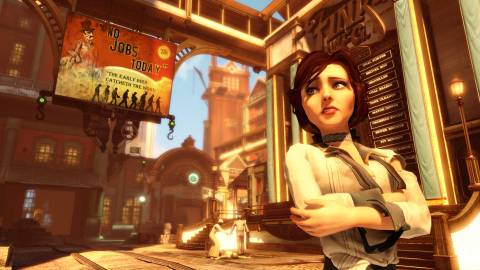
Jeff Gerstmann is a professional bull-rider and certified Zumba instructor working out of Northern California. When asked to rank his favorite video games for us, his initial response was "heck, I'm game for anything, but I'll tell you kids up front, I haven't played a video game since they got rid of the Total Carnage machine down at the 7-11 on Baywood." We figured that was good enough to come up with a list of 2013's best games. You can follow Jeff on Twitter or Tumblr, if you like. The newly redesigned "jeff gerstmann dot com" is expected to launch in 2014.
Video games were released in 2013. I have attempted to take 10 of the games I liked the most and fashion them into some sort of ordered list. Normally, this isn't an especially difficult process. But, then, very few things that went down in 2013 could be classified as "easy," so why should this list be any different?
If we look back on this year, I think we'll remember it as a year when the big games got bigger and safer while the small games started feeling, well, bigger. That's not to say that this is the first year for "indie" gaming to come into its own. That happened years ago. But those smaller games are getting tighter and sharper and better. The big games aren't exactly slouching, either, but with new consoles pounding their way into stores this year, the games that were forced to straddle the generational line suffered a bit. Also, the big games felt safer. Even Naughty Dog's bold end-of-the-generation send-off, The Last of Us, was built around the well-worn trope of "zombie fun." Obviously, it did a whole lot more with that concept than most games would.
Even with all that in mind, the gap between the big publishers' stuff and the small-team, self-published business felt narrower than before. Is that good or bad? That probably has to do with your own personal interests. I like big games, I like small games. My list ended up having some of each. It almost had Marvel Heroes on it, which I really enjoyed at the time and, upon returning to it recently to check in on its updates, it still seems to be moving in the right direction. Also, I really liked Papers, Please, but I couldn't find a way to get it onto this list ahead of any of these other games. Grand Theft Auto V damn near poked its way onto the list, too.

The Stanley Parable is intensely charming, with enough different paths and endings to make you believe that literally anything you did might have a meaningful impact on where you can go and what you can do. You might stumble into something that resets the game, or you might find yourself trapped in a seemingly endless loop of doors. Something even (sort of) happens if you do nothing. If they'd added a divorce, a treasure map, and karaoke instead of a baby, a fire, and a bomb then we might be looking at a twisted remake of Takeshi no Chousenjou. As someone who can get behind a game that deliberately fucks with the people playing it, The Stanley Parable is absolutely fantastic.
9. The Legend of Zelda: A Link Between Worlds
Sometimes, right before you doze off at night, you think little thoughts like "man, wouldn't it be cool if Nintendo stopped crappin' up the Zelda franchise and just made a direct sequel to an old Zelda game instead?" Then you fall asleep and tend to forget that your brain ever cooked up such a dumb idea. Nintendo has finally listened to those little impulses in the back of your brain by releasing a game that, in Japan, literally has the Japanese name for A Link to the Past ("Triforce of the Gods") with a fat "2" written after it. It builds on that world in inventive ways and lays out some of its progression in a very un-Zelda-like way.
It's weird to think that a throwback to the 16-bit days may be the most forward-looking Zelda in years, but... well, that's exactly what A Link Between Worlds is.
8. Metal Gear Rising: Revengeance
It's short and a little on the simple side once you learn a few different attack timings, but Revengeance shreds through the world of Metal Gear with a zest that feels directly opposite Kojima's standard plodding and contemplative pace. It practically serves up a gigantic walking tank for you to fight during its tutorial, letting you carve up a Metal Gear and setting the tone for a wild and weird adventure through the wilder and weirder world of American politics. By the time you get to the conclusion you'll probably have seen the insides of hundreds of different robot soldiers and you'll definitely have seen Raiden wearing a sombrero.
For a game that went through such a troubled early production, even the late hand-off to Platinum seemed risky. But everything comes together nicely.

7. Gunpoint
The moments right before you start actively working your way through a level are the best parts of Gunpoint. Getting a moment to glance at a level and start to work out what you're going to need to do to infiltrate, rewire, and escape from a given building makes all the difference. Of course, you can eventually just start rushing through things and making up solutions on the fly, and the game implements extremely frequent auto-saves to let you experiment without any real punishment. This helps make the stealth bits go down smoothly.
Also, diving on a guy from above and just punching the shit out of him is really satisfying.
6. Divekick
Divekick shouldn't be as good as it is. The jokes get a little too inside, the characters get a little too weird, and it's entirely reliant on you finding people to play against, which isn't always guaranteed these days. But it's so incredibly intense that every single hit feels like a shock from a taser. Every loss has you immediately rerunning the events in your head to figure out where you went wrong. And it does all this with two buttons. The dumb gimmick ends up being beautiful in its simplicity and way more involved than you'd expect.
In a way, Divekick feels like the sort of game that couldn't really exist as a commercial product until relatively recently. It's just the kind of tough sell that you'd expect to remain as some free, obscure hidden PC treasure that only a small handful of people ever feasibly play. It'd probably only have keyboard support and the graphics would, somehow, be even worse. That it was actually released onto proper digital storefronts and sold for actual money in hopes of finding an actual audience speaks volumes about the variety of games available to today's game-loving public.
I like Divekick a lot and should probably play more of it.
5. Assassin's Creed IV: Black Flag
How about this for a hell of a turnaround, huh? After Assassin's Creed III it felt like the franchise was just about finished: The last Ezio game sort of stunk up the joint and AC3 came through to finish the job by introducing a bunch of new, bad characters and a bunch of boring tree climbing systems that were probably really hard to build. Meanwhile, Watch Dogs was rolling down the pike with a ton of buzz. It looked like the open world cyber fantasy that I sort of always hoped that Assassin's Creed would properly address someday. Then Watch Dogs apparently didn't come together properly and got pushed way back and an even funnier thing happened: The Assassin's Creed IV team totally turned things around.
AC4 gives you a character you can get interested in and a world that you want to see. It gets close to the light and likable moments of Assassin's Creed II and Brotherhood while giving you a big-ass ship with which to explore a vast world of piratical fun. It mixes in a little hunting and crafting, Far Cry 3-style. And it delivers solid cities with climbable points and enough different gadgets and items to make you feel intensely powerful. Not that you'd need much help in that department, since the combat is really just a flashy set of easily followed prompts designed to make you feel like some kind of raw, murdering machine. You know what? It works.
Wrap that all up in a world that manages to make fun of all the Desmond stuff in a way that almost makes me forgive them for messing up all the Desmond stuff as badly as they did and yeah. I'm back on board, Assassin's Creed. Congrats to the development team (all 20,000 of you) for picking up the ACIII mess and making something useful out of it.

4. Rogue Legacy
In a year filled with games that made you say "rogue" without actually talking about Rogue, only one had the sheer audacity to put the word "Rogue" in its title. Actually, I don't know if that's true. Rogue Legacy's ties to proper rogue-likes are tenuous at best, but considering we've reached a point where every single game with any sort of consequence for death ever is now billed as a "roguelike" or perhaps even a "roguelike-like," Rogue Legacy is as roguish as it needs to be... and then some.
The skill tree and item system provides the hooks that keep you going and keep you feeling like you're making forward progress in your true quest of beating all of the castle's big, dumb bosses and winning. The random nature of the castle design leads to some wonderful surprises, including an explicit reference to the Konami arcade classic, Pooyan.
The tight control and different character options kept me obsessed with Rogue Legacy until I had completed it a couple of times and it's some of the most enjoyable time I've had with a game this year.
Is it weird that I have come to care about the characters in a game that treats its characters almost totally carelessly as a core part of its design? In some ways, the cast of Saints Row has become the video game equivalent of the cast of Ocean's Eleven. At this point, I'd probably play just about any game that had those characters in it and trust that the developers behind it would find a way to make it "the right kind of dumb."
Saints Row IV leans a little too heavily on its predecessor and, as a result, doesn't hit as hard as The Third did. But it was still an open-world game done with a fun-first attitude, rather than focusing on various AI behaviors and different ways to make its clockwork city more intricate. It's the Crackdown sequel I thought I very much didn't actually want anymore, cut with a pile of great interactions and left-turns that, these days, only Saints Row can get away with.
2. Antichamber
For me, the best puzzle games use up your brain like a resource. At some point, that resource is fully extinguished and you can't rely on it to help you solve any more parts of the puzzle. You're going to have to step away for a night (or, at least, a few hours) and come back refreshed to proceed. And, when I did that, the parts of Antichamber that tripped me up suddenly became easy, like the answer was rattling around in my stupid head the entire time. Like great puzzle games before it, Antichamber makes you feel smart when you're making progress without making you feel like a complete idiot every time you get stuck.
It also has a great visual style, for the most part, right down to the way it integrates its menus and map into the game's brain-kinking environment. And the various bricklaying tools you acquire and upgrade over the course of the game are simply fun to use. The puzzles are, largely, a joy to solve, and that made me stick with it until I'd seen as much of the game as I could possibly see. Was it 100% of the game? Heck, I don't know. Maybe I should jump back in there and check around, just to make sure I didn't miss anything...

I feel like the people who pick at BioShock Infinite's various paradoxes probably aren't much fun to be around. Those sorts of plot holes pop up in plenty of great multiverse and time-travel fiction. Did you sit outside a theater in 1989 to picket Back to the Future Part II, too?
But whatever, I'm not here to make excuses for BioShock Infinite. It stands on its own just fine. It creates a great-looking, interesting world that's full of mystery and fun to explore. It flips you around to different universes and realities with reckless abandon, letting you work to figure out what, exactly, has changed. It stitches together its story with combat that is, for the most part, fun to engage with, with the game's fast-moving skylines letting you outmaneuver the opposition in some pretty exciting ways. It's an escort mission that doesn't require you to babysit the person you're escorting. And the whole thing comes together in a series of interesting revelations that manage to reframe both the story you just witnessed as well as the BioShock franchise at large. It's a pretty cool trick that left me quite satisfied. It also opens the door for either a million more BioShocks or kills the franchise completely by revealing the universe's One Weird Trick. As weird as this may sound, I hope this leads to the end of BioShock. It's a great way to go out, and it'd be cool to see the team at Irrational create a different type of game.